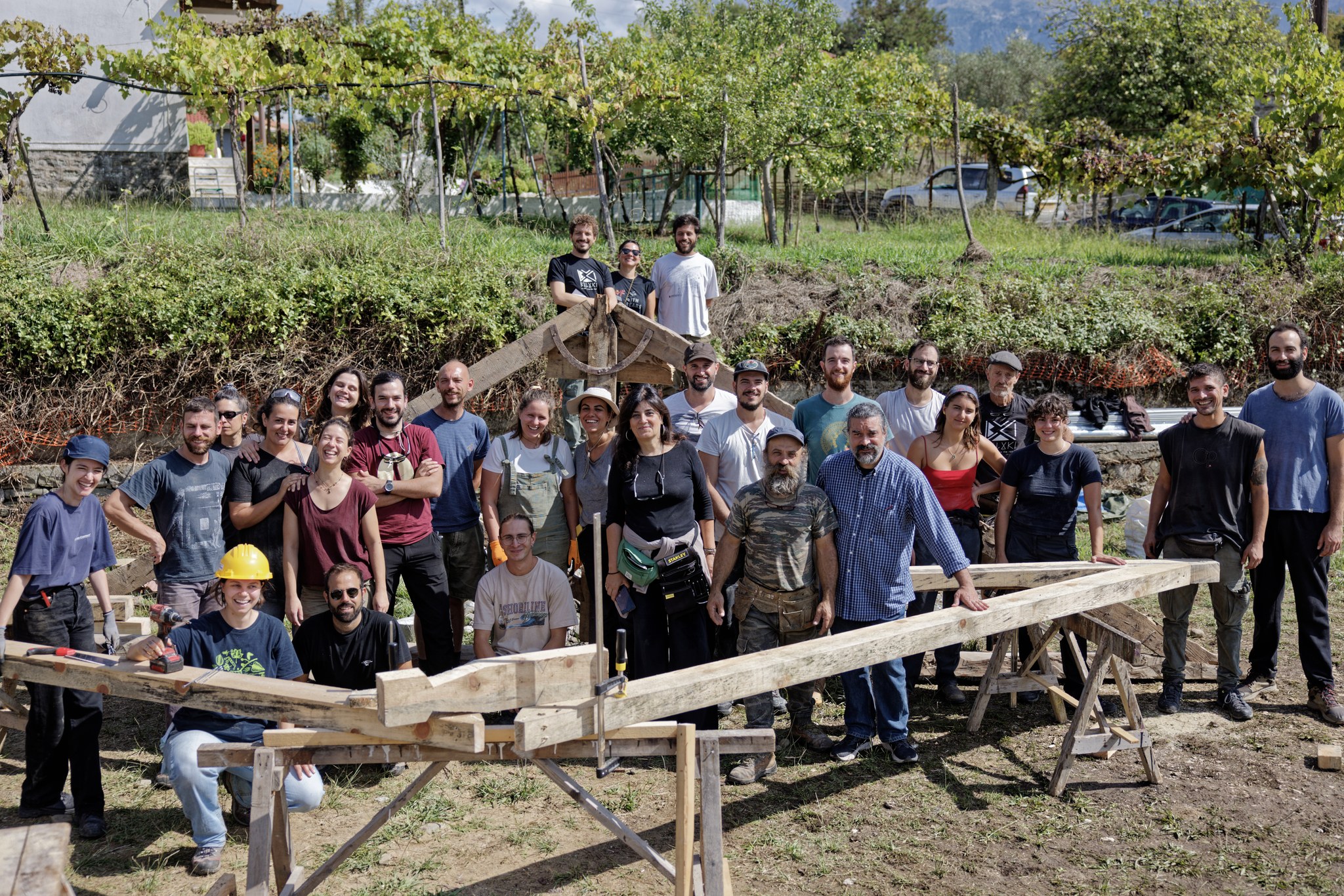Located in the picturesque village of Frasta, Central Tzoumerka, Greece, Boulouki is transforming an old school building into the country’s first centre dedicated to research and education in traditional and sustainable building practices. With support from an INTBAU Grassroots grant, Boulouki conducted two crucial studies that laid the foundation for the adaptive reuse of the building: the renovation of the school’s timber roof, and the design of a lime-based plastering system for its interior. Read on to learn about Boulouki’s efforts and how the INTBAU Grassroots grant has supported their work, showcasing how time-tested wisdom can address modern challenges.
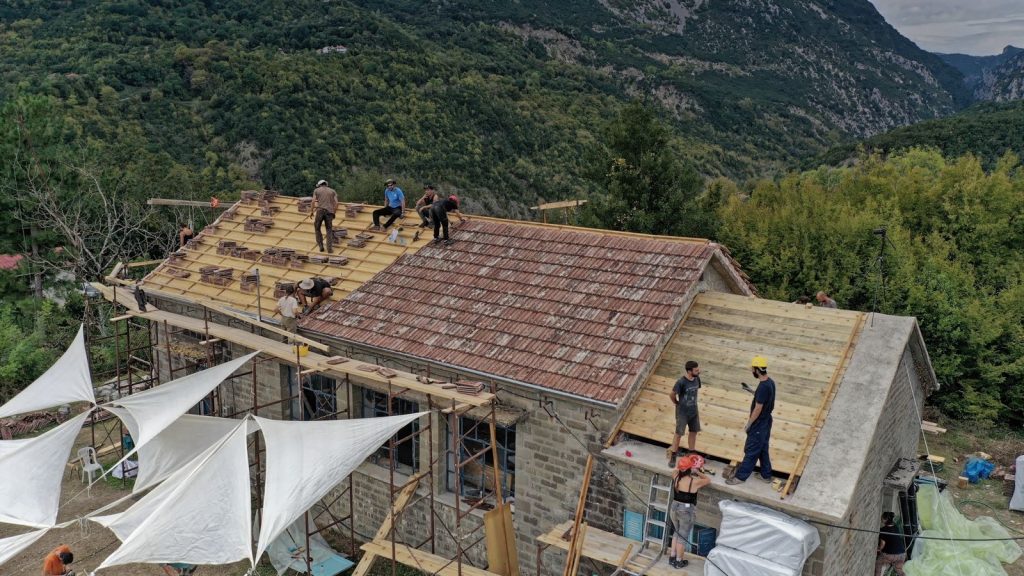
We go beyond preserving historical building practices as heritage assets. We focus on understanding how past generations built in harmony with nature, using local resources. This approach is a key path to environmental justice. By supporting this endangered community-held knowledge, we help modern architecture become more sustainable and reduce its carbon impact. — Boulouki
Boulouki’s approach aligns with the spirit of INTBAU Grassroots. The Programme was conceived recognising that the loss of traditional knowledge weakens social ties and limits access to sustainable solutions. Boulouki offers valuable lessons for addressing today’s climate challenges through time-tested wisdom.
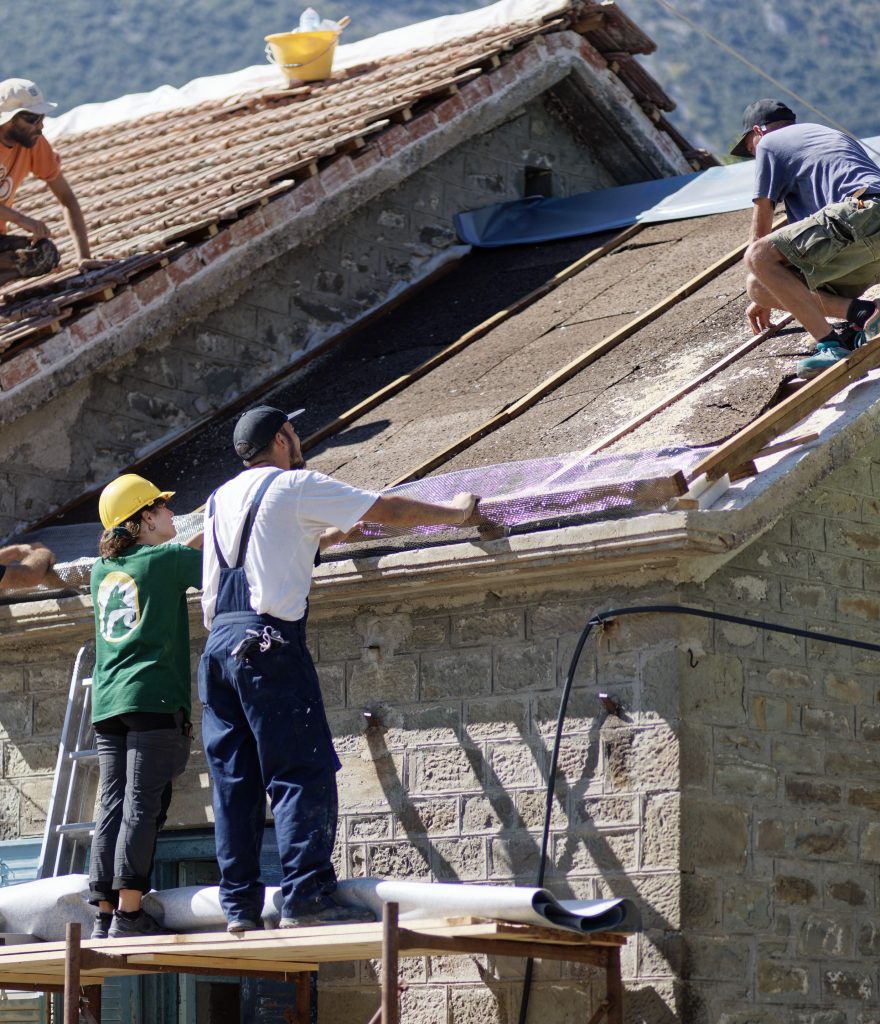
Studies on traditional building techniques and materials as cornerstones of the restoration
The two studies reflect our core values and principles, serving as pilot projects for the rehabilitation of historic buildings in the area and beyond. They emphasised innovation and sustainability, always through the lens of applying the traditional building techniques specific to the region, said the Boulouki team on the studies funded by the INTBAU Grassroots grant.
The local authorities entrusted the Frasta School to Boulouki, and its restoration has been underway since 2022. The project, carried out through hands-on training programmes, is set to be completed by late 2025. At its core are two sustainable renovation studies, funded by INTBAU Grassroots, which address key challenges in restoring this historic building:
I. Timber roof restoration:
This study focused on repairing and upgrading the roof to ensure structural integrity and improve environmental performance. Through a participatory approach, the project explored natural insulation materials such as compressed sawdust, cork, and sheep’s wool, which align with both traditional techniques and modern energy efficiency requirements.
It also incorporated an innovative mix of reusing existing materials and crafting new components. Reused elements included timber, most of the ceramic tiles, and bricks and stone salvaged from lowering several walls. Newly crafted components, such as mortises, tenons, and hardwood pegs, were created with minimal reliance on mechanical tools.
A key challenge was designing and applying thermal insulation using natural materials. We were thrilled to see the project come to life, with 26 participants from Greece and abroad, supported by a team of 7 experts.
Click to expand:
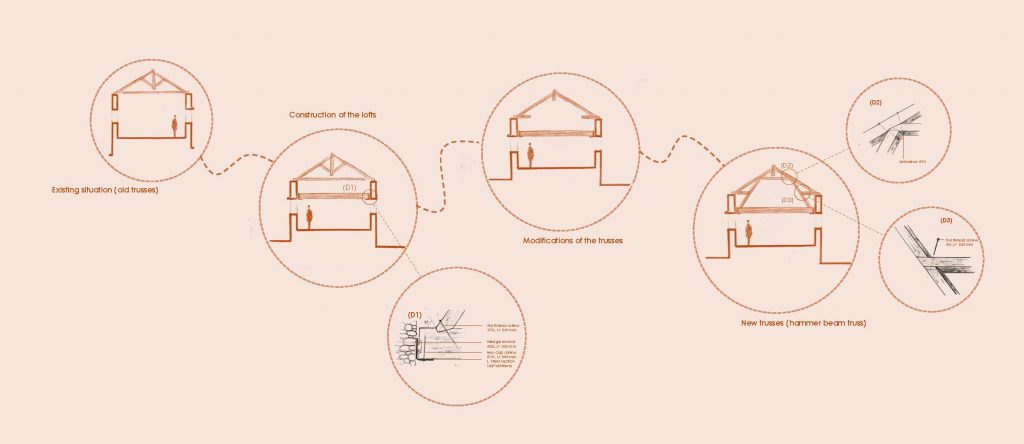
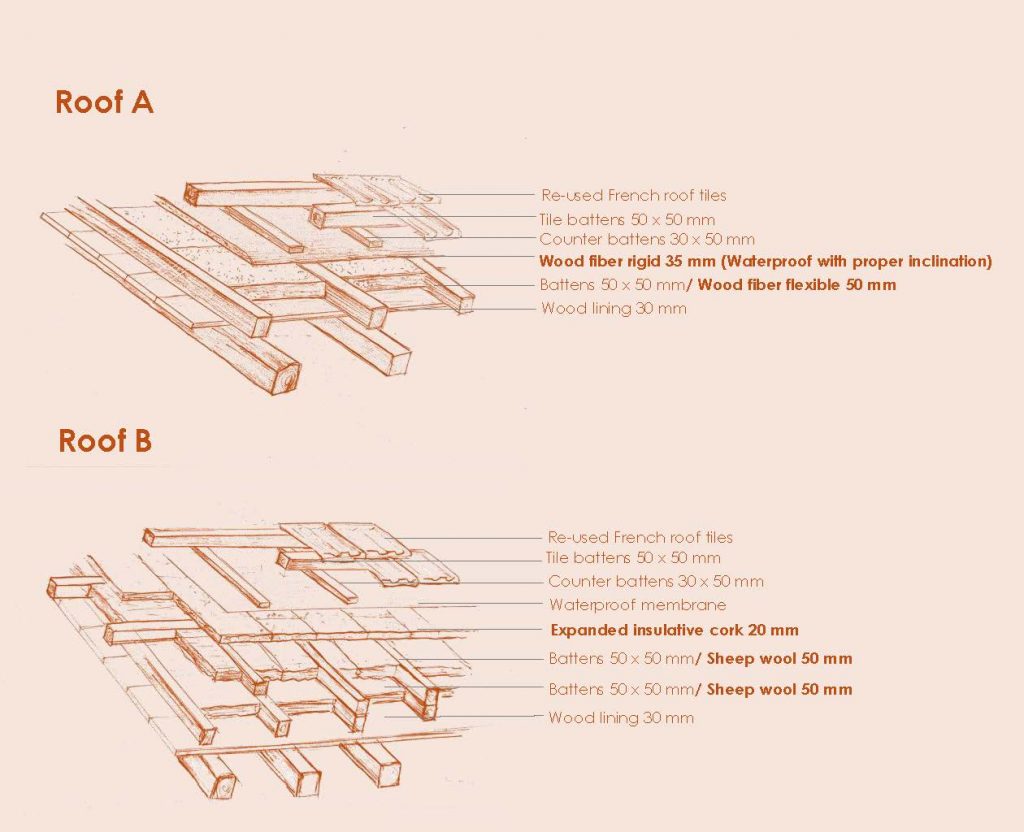
Click to expand:
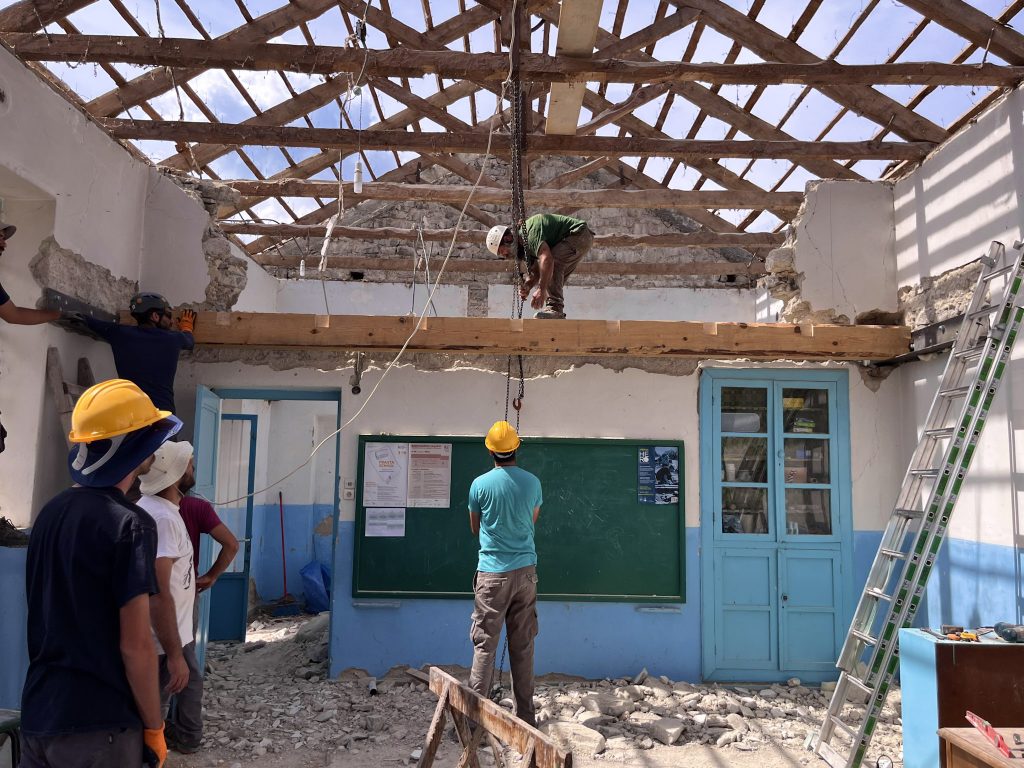
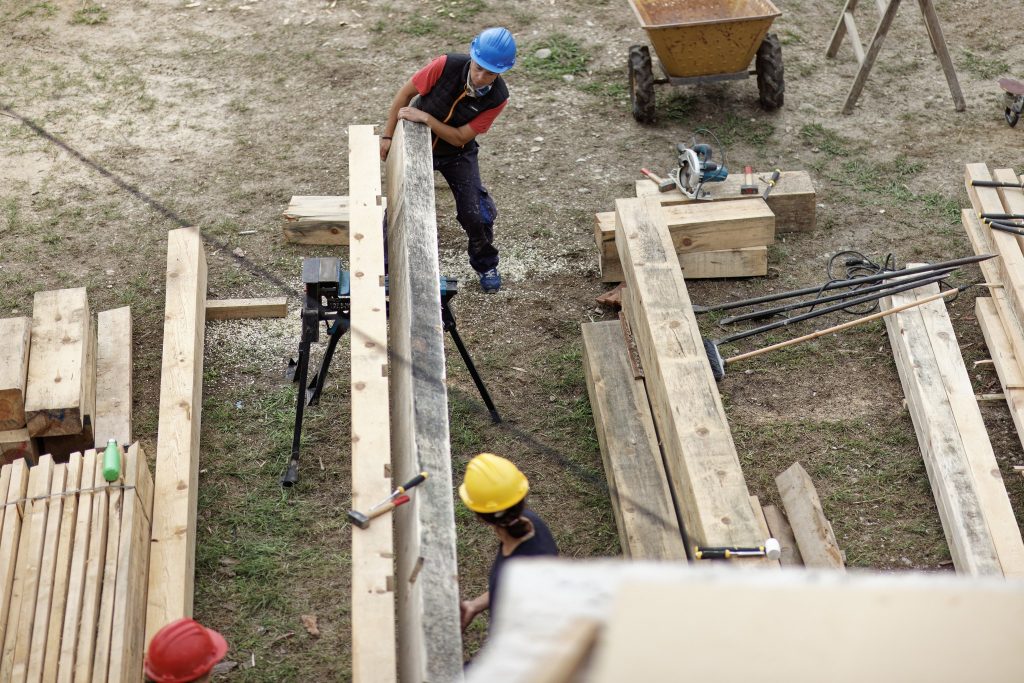
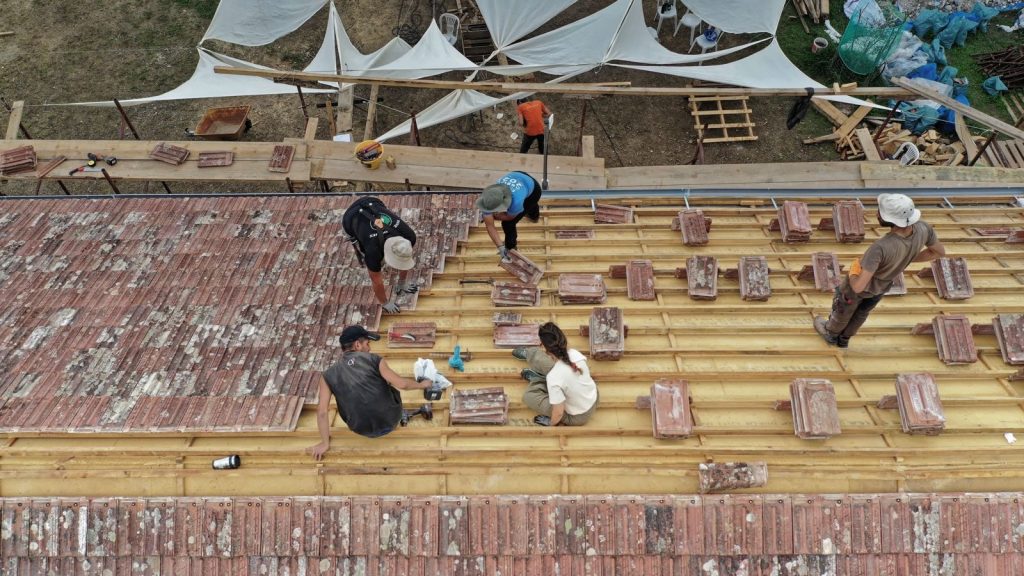
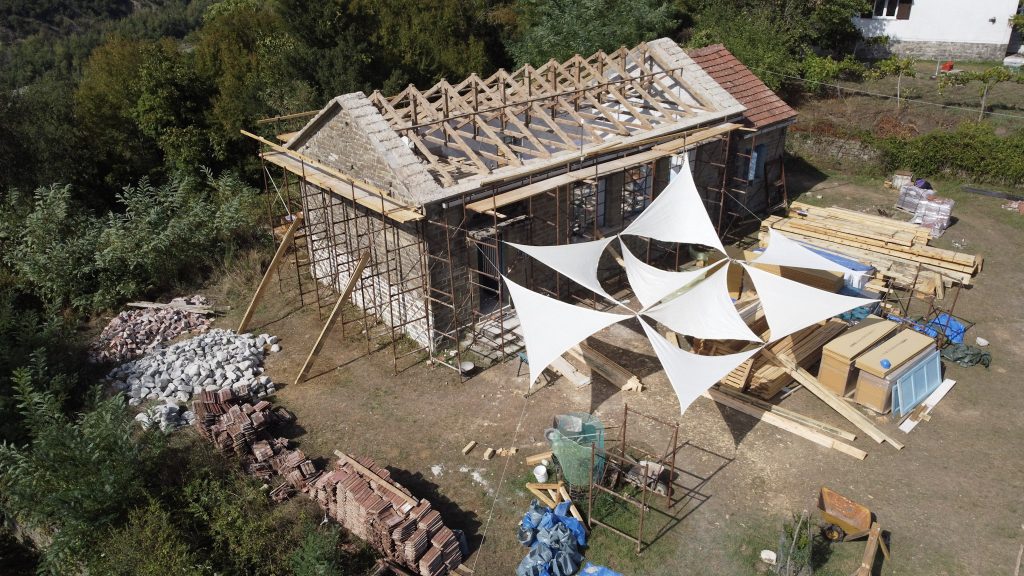
II. Lime-based plastering system design:
The second study aimed to design a sustainable lime-based plaster for the school’s interiors. Lime plaster is a traditional material that balances breathability, durability, and eco-friendliness. This second study sets the stage for the next phase of restoration, when the plaster will be applied through another hands-on training programme in 2025.
Empowering communities through participatory training
The restoration of the Frasta School goes beyond physical rehabilitation; it is an inclusive project that brings together local and international participants for hands-on learning.
In September 2024, the timber roof study concluded with an education programme that included a month-long apprenticeship and a two-week workshop. Participants from Greece and abroad worked alongside experts, learning traditional skills while contributing to the building’s transformation. The programme featured various activities and events to encourage public participation, such as open worksite days, lectures, guided tours, and a communal feast.
Similarly, the plastering study will offer opportunities for future apprentices and craftspeople to engage with local construction techniques.
Our participatory training programmes are designed to involve locals who face barriers to education and employment,’ the team shares. ‘This ensures that the restoration process creates economic and social value for the community.
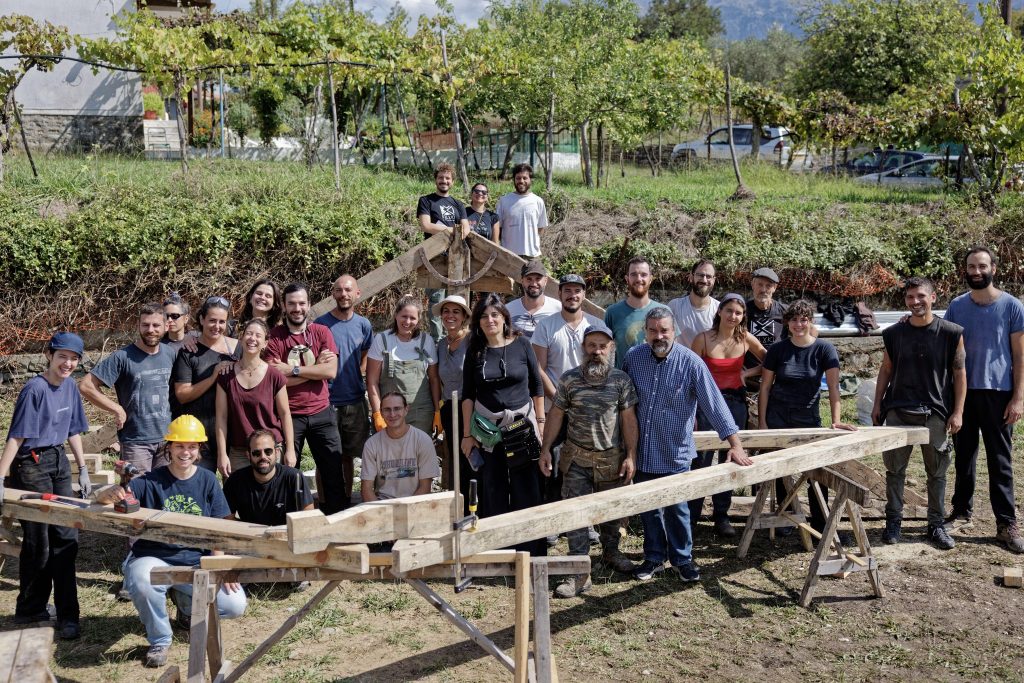
A handbook to preserve and share traditional building wisdom
To expand the reach of their work, Boulouki is creating a 20-page digital handbook, funded by the INTBAU Grassroots grant, to share insights from their renovation studies. Designed for a wide audience, including architects, engineers, and craftspeople, the handbook will offer practical knowledge on sustainable and traditional building methods, with a particular focus on environmental benefits.
The publication will highlight the replicability and scalability of the techniques used in the project, providing a framework to inspire similar efforts both locally and globally. By combining theoretical insights with practical tools, it will demonstrate how traditional craftsmanship can address modern challenges, such as decarbonisation and resource efficiency.
Freely accessible and illustrative, the handbook will serve as an educational resource, making Boulouki’s innovative solutions available to the local community and the broader field of sustainable construction.
Looking ahead
As the restoration of Frasta School progresses, Boulouki continues to lead the way in integrating traditional craftsmanship with sustainable innovation. The upcoming digital handbook will extend the reach of their work, offering valuable insights to architects, engineers, and craftspeople around the world. Stay tuned for further updates on the handbook’s release and the next stages of the project, including the lime plastering programme set for 2025.
Learn more about the INTBAU Grassroots Grants Programme and apply today at: Grassroots | INTBAU
About Boulouki
Boulouki is an interdisciplinary research collective focused on preserving traditional building techniques and materials. The name “Boulouki,” meaning “travelling group” in Greek, reflects the tradition of mobile craftsmen. The organisation works to document and share this knowledge through workshops and building projects in collaboration with local communities.
Primarily active in Epirus, a region known for its stone masons and cultural heritage, Boulouki integrates traditional techniques into modern construction practices. Their goal is to combine conservation with contemporary applications. Boulouki’s work also reaches other places in the country. On Delos Island, they are exploring the adaptive reuse of a rare vernacular farmhouse studying the entanglement of traditional knowledge with ancient practices. In Ios and Epirus they are addressing water scarcity by restoring traditional water management systems, promoting nature-based solutions and biodiversity enhancement.
The organisation recently completed the Erasmus+ HERO programme, where they developed educational resources to train heritage restoration professionals, furthering their commitment to preservation and sustainability.
With strong academic partners, including the National Technical University of Athens, Boulouki continues to expand its network. Through their work, they aim to promote a hands-on approach to cultural heritage, helping communities thrive and fostering sustainable development. Learn more.
Written and edited by: Antonio R. Quiroz Soto
With information from: Boulouki
